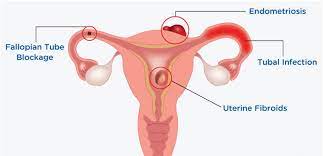How STIs Steal the Future: Africa’s Silent Crisis

Sexually transmitted infections (STIs) are among the most silent yet devastating causes of infertility in Africa. While STIs are often associated with discomfort or embarrassment, their long-term effects on reproductive health are frequently overlooked. Untreated infections such as chlamydia, gonorrhea, syphilis, and HIV can cause permanent damage to the reproductive system, leading to infertility in both men and women.
In many African countries, poor access to early diagnosis and treatment—especially in rural areas—worsens the problem. Understanding the link between STIs and infertility is critical to breaking the cycle of stigma, poor healthcare access, and preventable childlessness.
How STIs Affect Fertility
STIs do more than cause temporary infections. When left untreated, they lead to complications that can block reproductive pathways, damage organs, and affect overall fertility.
1. Chlamydia and Gonorrhea
-
These are two of the most common STIs globally and in Africa.
-
They often show no symptoms, meaning people may not seek treatment.
-
In women, untreated infections can cause pelvic inflammatory disease (PID), which leads to scarring of the fallopian tubes and prevents eggs from reaching the womb.
-
In men, chlamydia and gonorrhea can cause epididymitis (inflammation of the tubes carrying sperm), leading to low sperm count or blocked sperm flow.
2. Syphilis
-
If untreated, syphilis can cause stillbirths, miscarriages, and neonatal deaths.
-
It may also increase the risk of infertility by damaging reproductive organs and raising the likelihood of co-infections with other STIs.
3. HIV (Human Immunodeficiency Virus)
-
HIV itself does not directly cause infertility, but it weakens the immune system, making individuals more prone to reproductive infections.
-
HIV drugs (antiretroviral therapy) can sometimes affect hormone levels and fertility, but the greater challenge is the stigma that discourages people from seeking reproductive care.
The Hidden Burden in Rural Africa
One of the biggest challenges is limited access to early diagnosis and treatment, especially in rural and low-income communities.
-
Lack of awareness: Many people do not recognize STI symptoms or associate them with fertility problems.
-
Poor healthcare infrastructure: Rural clinics are often understaffed and lack diagnostic tools.
-
Stigma and cultural barriers: People avoid seeking help due to fear of being judged or shamed.
-
Cost of treatment: Even when services are available, financial constraints prevent many from accessing care.
As a result, STIs often go untreated for years, silently damaging reproductive health and leading to preventable infertility.
The Social Impact of STI-Related Infertility
In Africa, infertility carries deep social consequences, especially for women. When infertility is linked to untreated STIs, the stigma doubles. Communities may label women as “promiscuous” or men as “weak,” creating isolation and shame.
-
Marital Pressure: Infertility often leads to strained marriages, polygamy, or divorce.
-
Psychological Stress: Couples may face depression, anxiety, and loss of self-esteem.
-
Community Judgment: Infertile couples are often excluded from cultural and social roles tied to childbearing.
These challenges highlight the urgent need for education, prevention, and accessible healthcare.
Breaking the Cycle: Prevention and Solutions
Addressing STI-related infertility in Africa requires a multi-level approach that combines healthcare, education, and cultural transformation.
-
Awareness Campaigns
-
Communities must be educated about the connection between STIs and infertility.
-
Schools, churches, mosques, and local leaders should be engaged in spreading accurate information.
-
-
Early Diagnosis and Screening
-
Affordable and accessible STI testing should be prioritized, especially in rural areas.
-
Couples facing infertility should both be screened for STIs as part of routine evaluation.
-
-
Treatment and Healthcare Access
-
Governments and NGOs must invest in equipping rural clinics with diagnostic tools and medications.
-
Subsidized or free treatment programs should be scaled up to encourage early intervention.
-
-
Destigmatizing STIs
-
Public health campaigns should normalize conversations around STIs, emphasizing that infections are treatable medical conditions—not moral failings.
-
-
Integration of Services
-
STI prevention should be integrated into maternal health, family planning, and HIV care programs to create a holistic reproductive health approach.
-
Conclusion
The impact of sexually transmitted infections on fertility in Africa is profound yet preventable. Untreated STIs such as chlamydia, gonorrhea, syphilis, and HIV silently rob millions of men and women of their ability to conceive. With better awareness, early diagnosis, affordable treatment, and cultural openness, we can break the cycle of stigma and childlessness.
Infertility should not be a life sentence caused by an untreated infection. It is time for Africa to invest in reproductive health, fight STI stigma, and protect the future of families across the continent.
Written by Fawzi Rufai, Medically Reviewed by Sesan Kareem




